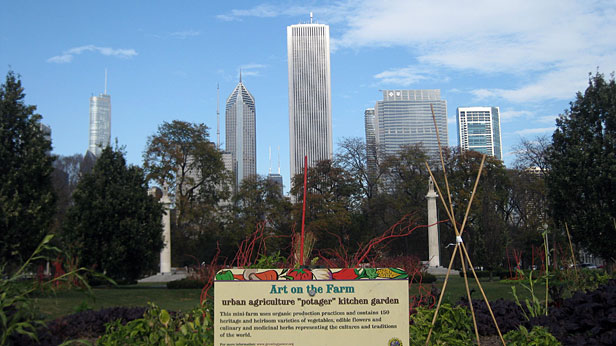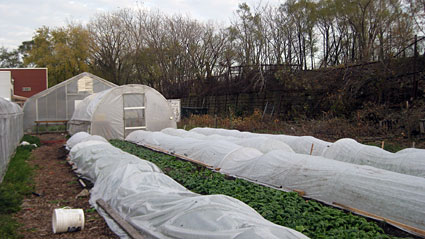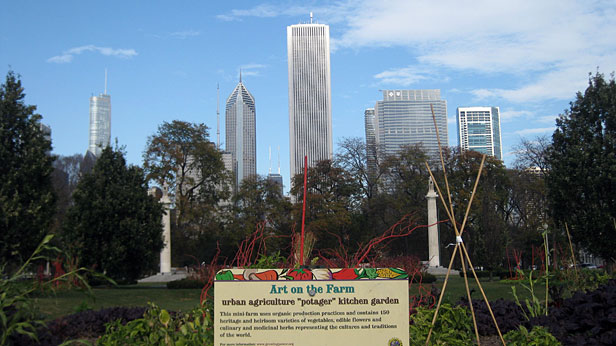 Exhorticulture: Growing Power’s inspiringly artsy garden in Grant Park.Photos: Natasha Bowens
Exhorticulture: Growing Power’s inspiringly artsy garden in Grant Park.Photos: Natasha Bowens

The Color of Food series is about my experiences searching for black and Latino farmers in the sustainable food movement.
As I glided smoothly above Chicago’s streets on the L and looked out at the crisp city skyline, I wished I were staying in the city longer. But as soon as I stepped off the L and into the 28-degree weather of November, I was glad I was only in Chicago for a few days.
I’d hoped to spend a few months interning for Growing Power Chicago, but due to their extremely busy fall season, they had to postpone the internship program. However, I couldn’t resist stopping in to check out their gardens and visit other farmers of color and food justice organizations in the city.
The Growing Power projects are run by Erika Allen, daughter of Will Allen, CEO of the Milwaukee-based organization. (See Grist’s interview with this urban-farming official “genius.”) The projects focus on food justice and youth education in Chicago’s Southside as well as other parts of the city.
One of the gardens sits right in the middle of the city in Grant Park and is an impressive display of the aesthetic possibilities of a vegetable garden. The 20,000-square-foot garden (pictured above) is a collaboration with the Chicago Park District and Moore Landscapes, and is named “Art on the Farm.” Its carefully designed vegetable beds complement the stunning view of the city skyline and Lake Michigan, and the 150 heirloom varieties of vegetables grown there help feed Chicago. It also serves as a space for youth education and job training.
The thing that stood out to me about the Growing Power gardens was that they are completely weed free! Since I’ve been spending much of my time on farms this summer endlessly pulling weeds, I was pretty fascinated by this. Apparently weed-free gardens are easier when you start with super-nutrient-rich soil, which Growing Power creates using vermicompost, that is free of unwanted seeds from the beginning. Simply said: worm poo = no weeds.
My Chicago travels also brought me to Growing Home, a unique urban farm organization that is working to grow healthy food for the city while empowering formerly incarcerated residents in the Southside of Chicago by providing paid job training on the farm. (See Grist’s previous coverage in the Breaking Concrete series.)
“My grandma had a garden in her backyard, but she didn’t do it for fun; she did it because she had to. Growing was her empowerment.”
I showed up to the farm in the Southside neighborhood of Englewood during a community outreach event. They were screening the documentary film The Garden and hosting a nutritional cooking workshop, where I learned to make a raw apple pie. Unfortunately, Growing Home seems to suffer from one of the same challenges that many nonprofit organizations do: successful outreach. Though the event was sparsely attended, the staff was still full of energy and passion for their work.
Seneca Kern, the community outreach coordinator, said his biggest challenge was breaking through the perception that food is not important. As a society, “we’ve trivialized food,” said Kern. “We think our whole sustenance should come from fake food that tastes good. We have to give it more importance than that.”
Kern spoke about how Growing Home is trying to change that perception with their work in the community, not only with the job trainees, but with the local youth. Some of the challenges they face in doing that work come from within.
“In under-served communities there is often an undercurrent that things are owed to us. In a way they definitely are, but we owe some things to ourselves,” said Kern. “When I talk about farming with [black or African American] youth, slavery comes up in the first 20 minutes, but the only reason I know anything about agriculture is because of my grandma. She had a garden in her backyard, but she didn’t do it for fun; she did it because she had to. Growing was her empowerment.”
 Chicago’s Growing Home fields protected for winter.Tim Murakami, Growing Home’s Urban Farms Manager, gave me a tour of the half-acre site, which consists mainly of three large hoop houses in which they grow salad greens and other vegetables for market. They also have a large farm outside the city, in Marseilles, that brings in more vegetables for market and serves as an additional farm-training space for the trainees.
Chicago’s Growing Home fields protected for winter.Tim Murakami, Growing Home’s Urban Farms Manager, gave me a tour of the half-acre site, which consists mainly of three large hoop houses in which they grow salad greens and other vegetables for market. They also have a large farm outside the city, in Marseilles, that brings in more vegetables for market and serves as an additional farm-training space for the trainees.
“Our biggest market is the Green City Market in Lincoln Park on Saturdays, but we also have a small market here in Englewood,” Murakami told me. Englewood, famous for its murder history, still has one of the highest crime rates in the country. At its inception, Growing Home was working with the neighborhood’s homeless, providing paid work and job training. Later they began working with local residents who’ve struggled with substance abuse or criminal records as well.
The trainees work on the farm as well as get class time. When I asked Murakami if he thought the program was successful, he said it was definitely an uphill battle but that there were some special successes.
Last year, even in this down economy, “there were people that stood out and got jobs,” he said. “We were a starting point for them. Imagine, a 40-year-old woman who has never had a job before gets a job … all because of our program here on a farm in Englewood.”
I can imagine that, now, and I was happy to see another path to food justice that I hadn’t before considered.
Check out some of the other great urban farm organizations in ChiTown:
- City Farm Chicago
- Green Youth Farm, project of the Chicago Botanical Garden
- Roots & Rays Garden, located in Pilsen, a majority Latino neighborhood
- Xochiquetzal Peace Garden, Pilsen
- Kilbourn Park Organic Greenhouse and Community Garden
- Dunne Tech/Southside Educational Farm


